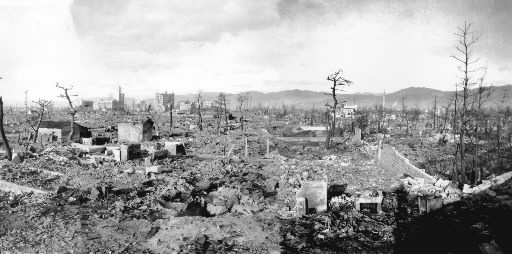Trust: The Memoirs of Akira Yamamoto, Part 10
Oct. 12, 2012
Part 10: Sent home to ruins
Brother killed in A-bombing: Parents weep bitterly
In April 1945, seven of the graduates from the 12th class for naval paymaster probationary officers were assigned to the No. 2 Navy Air Base in Kisarazu, Chiba Prefecture. Of those, I alone was ordered to go to Sanuki-cho (now part of Futtsu). We were to dig caves into the side of the mountain at various spots along the pass, put machinery in them for safekeeping and repair aircraft parts there.
After about one month had passed, I summoned my wife and daughter to come live with me. I did not know what the future held, and I wanted to be with them. That was all I was thinking of. Nobuko felt the same way.
Recalling the past, Nobuko, who is now 89 years old, said, “Yamomoto told me in all seriousness that if the enemy landed on Kujukuri Beach, he would charge them. But our family was together, so we were happy.”
There were no pots or pans at our lodgings. So I cut an oil can in two and used one half for a potty for Mitsuko (his daughter) and the other half for a pot. Nobuko was pregnant and started to have morning sickness. On June 1 I was commissioned as an ensign.
On August 6 a new type of bomb was dropped on Hiroshima. (The official announcement by the headquarters of the Imperial Japanese Army was made at 3:30 p.m. on August 7.) I read newspaper reports and listened to the radio, but it wasn’t really clear what had happened. I was terribly worried about my parents, relatives, friends and the newspaper employees, but I had no way of knowing what had happened to them.
On August 15 we were told that there would be a broadcast by the emperor at noon and that we should listen to it. I thought he was just going to encourage us and tell us to hang in there a little longer. I listened to the broadcast on the grounds of an elementary school. At first I didn’t really understand what it was all about, but eventually I realized it meant that Japan had lost the war. I remember clearly the women teachers sitting on the ground and weeping.
Everyone was on edge. We were anxious too. In late August Sueo Sugiura of the paper’s Tokyo bureau went to Hiroshima and came to tell me about the situation there. He gave me news of everyone. My parents were OK, he said, but my brother, who was a member of the news team at the Chugoku District Military Headquarters (on the grounds of Hiroshima Castle), had been killed. He also said that preparations were being made to print the paper using a press that had been moved to the outskirts of town (Nukushina, Higashi Ward). It was a shock, but I was grateful to get some information. I was finally able to prepare mentally for my return to Hiroshima. I wanted to see my parents first of all.
On the morning of September 1 I departed from Sanuki Station. The view from Tokyo Station and from everywhere along the rail line was one of burned-out ruins. It was depressing. Sometime the next afternoon I arrived at Hiroshima Station. The devastation was even worse than I had heard.
The Chugoku Shimbun’s building was burned out but still standing. I gazed at it fixedly from afar as I walked along. As I got closer, I saw that someone was standing on the balcony. It was Tetsuo Murakami (chief editor). Without thinking I called out to him loudly and ran into the building. It was the first time I’d seen someone else from the company in Hiroshima.
I hurried (by truck) to Fuchu-cho (Aki-gun). I was told that my parents had evacuated there in July. Both of them had aged much more than I expected in the year I’d been gone.
I came into the house, knelt down and bowed. “I’ve been demobilized and sent home,” I said. “It’s a shame what happened to Toru.” My father and my mother flung themselves to the floor and burst into tears. I remember this scene as clearly as if I had recorded it on video. I recall everything, including my parents’ expressions. Later, when the subject of what we had thought when the war ended came up, my father said he thought to himself, “Now one of my sons has been saved.” With the death of my brother and the atomic bombing, my father’s spirit had been broken, but my mother told me that after I came home he got much better.
In accordance with the custom of those days, the next day I went around the neighborhood attired in my full dress officer’s uniform telling everyone that I had been demobilized and returned home. That was the last time I wore my uniform.
(Originally published on October 6, 2012)








